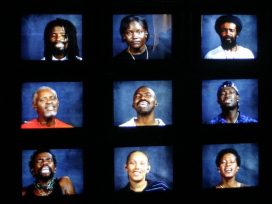 “You do not interest me. No man can say these words to another without committing a cruelty and offending against justice,” writes philosopher Simone Weil. To turn a deaf ear is an offence not only to the ignored person but also to thinking, justice and ethics. Coleridge’s Ancient Mariner is cursed because no one will listen to his story. The Italian chemist-turned-writer Primo Levi was preoccupied with this fable because of his fear that on returning from Auschwitz people like him would be either ignored or simply disbelieved. Regardless, listening gets a very mixed press amongst critics and intellectuals. There is a suspicion of “wistful optimism” or the quasi-religious appeal to “hold hands” and play priest at the confessional. These qualms miss the centrality of listening to a radical humanism which recognises that dialogue is not merely about consensus or agreement but engagement and criticism. This is something that Primo Levi understood.
“You do not interest me. No man can say these words to another without committing a cruelty and offending against justice,” writes philosopher Simone Weil. To turn a deaf ear is an offence not only to the ignored person but also to thinking, justice and ethics. Coleridge’s Ancient Mariner is cursed because no one will listen to his story. The Italian chemist-turned-writer Primo Levi was preoccupied with this fable because of his fear that on returning from Auschwitz people like him would be either ignored or simply disbelieved. Regardless, listening gets a very mixed press amongst critics and intellectuals. There is a suspicion of “wistful optimism” or the quasi-religious appeal to “hold hands” and play priest at the confessional. These qualms miss the centrality of listening to a radical humanism which recognises that dialogue is not merely about consensus or agreement but engagement and criticism. This is something that Primo Levi understood.
Faussone, the hero of Levi’s novel The Wrench, is a difficult man. An itinerant rigger, he spent his life travelling the cities of the world operating high-rise cranes. Despite the dramatic nature of his adventures Faussone is not a natural storyteller. The novel’s narrator comments on how tempting it is to interrupt him, put words in his mouth and spoil his stories before they have even been told. He comes to realise: “Just as there is an art of storytelling, strictly codified through a thousand trails and errors, so there is also an art of listening, equally ancient and noble, but as far as I know, it has never been given any norm.” The quiet patience required to invite the story’s telling makes an important contribution to its content. For, as Levi writes, “a distracted or hostile audience can unnerve any teacher or lecturer; a friendly public sustains.” The listener’s art for Primo Levi is practised through abstaining from speech and allowing the speaker to be heard. Listening is active, a form of attention to be trained rather than presumed.
In his famous essay on the storyteller, Walter Benjamin lamented the loss of attention to stories and tales which could be “woven into the fabric of real life” as wisdom. The profusion of talk and information inhibits social transactions of understanding. Our ears become soundproofed, double-glazed like our homes to keep out the noise of the city.
Levi was arguably the most astute witness to the Nazi holocaust, and his commitment to listening derives from his experience of being a witness and survivor, but it is also an essential part of his skill as a writer. In Primo Levi’s Ordinary Virtues: From Testimony to Ethics, his brilliant study of the moral dimensions of Levi’s work, Robert Gordon suggests that the primal scene of his ethics of listening is the chapter in If This Is a Man called the “Canto of Ulysses”. This book is a chronicle of the year he spent as a prisoner in Auschwitz, where his trade as chemist was pressed into the service of the regime in the Chemical Kommando. The chapter recounts a moment of reprieve inside the fierce rhythm of the camp.
Jean, the Pikolo of the barrack charged with implementing and coordinating its routines, suggests Primo be his assistant in carrying the daily rations to the barracks. The sunshine and fresh air fill the men with memories of life before their internment. The walk is just a half a mile but on their return they have to carry a huge pot of soup supported by two poles, weighing over a hundred pounds. During the hour’s journey the two men speak of their homes in Strasbourg and Turin, the books they read and their families. Dante’s Divine Comedy comes to Levi’s mind and he starts to recount the lines from the Canto of Ulysses. The task of transporting Dante’s words into the camp takes on a frantic sense of urgency:
Here, Pikolo, open your ears and your mind, you have to understand, for my sake:
“Think of your breed; for brutish ignorance
Your mettle was not made; you were made men
To follow after knowledge and excellence.’
As if I also was hearing it for the first time: like a blast of a trumpet, like the voice of God. For a moment I forgot who I am and where I am.
The lines are not only a reminder of the life he had before but also that human communication could be concerned with such things as books, thinking and a search for beauty and knowledge. It is a reminder that he and Pikolo are not mere Häftlings defined only by the number inscribed on their skins and that there is a universe and a time before and beyond the barbed wire. He continues: “Pikolo begs me to repeat it. How good Pikolo is, he is aware that it is doing me good. Or perhaps something more: perhaps, despite the wan translation and the pedestrian, rushed commentary, he has received my message, he has felt that it has to do with him, that it has to do with all men who toil, and with us in particular; and that it has to do with us two, who dare to reason of these things with the poles for soup on our shoulders.”
It is not just that Primo Levi needs to speak of these things, neither is it a matter of Pikolo yearning to grasp Dante’s meaning. The two men in that moment furnish their world anew if only for the hour it takes to deliver the soup. The process summoning the lines from Primo’s memory involves both men. Their shared labour enacts a line of communication and communion in the midst of the barbarism and inhumanity of the camp. Speaking and listening here is collective, social and ethical. Studied hearing is a humane disposition practised by Levi inside the camps as a survival strategy but also as a means to remain connected to the past and indeed to the future.
 The value of listening is to keep a bridge open in the present between the past and the future. The listener – as the society’s ear – establishes an ethical link to those who are not heard or who are ignored. The exemplar of this in the 20th century is Studs Terkel, who died in 2008. Producing over 18 books of oral history and radio interviews, Terkel became the confidant of film stars, great musicians and writers as well America’s ordinary men and women. Though born in New York he became inextricably linked with the city of Chicago and its people. He took the nickname “Studs” from his admiration of James T Farrell’s Studs Lonigan. He was an actor, writer and cultural impresario, but Terkel’s true gift was as an artful listener and his show on Chicago’s WFMT public radio station gave him both a platform to exercise his crafted forms of empathy and an audience eager to hear the fruit of his conversations. For an hour each weekday Terkel interviewed one person or a group of people about their lives, live on radio, and the show ran for 45 years. Sociologist Howard Becker, himself closely connected to the city of Chicago, told me recently that when Studs Terkel really approved of a comment from one of his guests he would pause for a few seconds and then simply say, “Yeah…” as if he was appreciating Mahalia Jackson’s voice or a musical phrase by Dizzy Gillespie.
The value of listening is to keep a bridge open in the present between the past and the future. The listener – as the society’s ear – establishes an ethical link to those who are not heard or who are ignored. The exemplar of this in the 20th century is Studs Terkel, who died in 2008. Producing over 18 books of oral history and radio interviews, Terkel became the confidant of film stars, great musicians and writers as well America’s ordinary men and women. Though born in New York he became inextricably linked with the city of Chicago and its people. He took the nickname “Studs” from his admiration of James T Farrell’s Studs Lonigan. He was an actor, writer and cultural impresario, but Terkel’s true gift was as an artful listener and his show on Chicago’s WFMT public radio station gave him both a platform to exercise his crafted forms of empathy and an audience eager to hear the fruit of his conversations. For an hour each weekday Terkel interviewed one person or a group of people about their lives, live on radio, and the show ran for 45 years. Sociologist Howard Becker, himself closely connected to the city of Chicago, told me recently that when Studs Terkel really approved of a comment from one of his guests he would pause for a few seconds and then simply say, “Yeah…” as if he was appreciating Mahalia Jackson’s voice or a musical phrase by Dizzy Gillespie.
Although an engaging broadcaster, Studs Terkel’s gift was his ability to share time. He was an amateur sociologist in the best sense, an enthusiast, rapt in his attention to the voices of people but often ham-fisted in his attempts to record them. He told Tony Parker:
I don’t know how a tape recorder works. Not even the simplest one that’s ever been invented … I don’t know how to open it, I don’t know how to put in the cassette, which way up it goes, how to close the lid when it’s in, which button to press to get it to start recording, which is the button to press to make it stop. None of it, I don’t know any of it … what am I describing? I’m describing one of my biggest assets. Its name is ineptitude. Why’s it an asset? Well, would you be frightened of a little old guy who wants to tape-record a conversation with you – and he can’t even work his tape recorder? … I am not a Messiah with a microphone, I’m just another human being.
Stud’s ineptitude was a part of his skill. This charismatic clumsiness enabled him to connect with people and gain their confidence. The hours of tape-recorded interviews that were transcribed verbatim formed the basis of his books that documented a forgotten America like Division Street (1967) and Hard Times (1970), or provided a compendium of unappreciated contribution to the society like Working (1974) or invited Americans to speak about taboos and open yet public secrets like his book simple entitled Race (1992). For him, the tape-recorded interview is conversation, not an inquisition aimed at facilitating the speaker to tell him “what happened” and then “what happened next”. Towards the end of his life Terkel was still incredibly prolific and he published four books after turning 90. This coincided with the demise of his greatest asset – his hearing. After Terkel’s death in 2008 friend and associate Garry Wills reflected: “Bad as this would be for any of us, it was a special blow to Terkel, whose speciality was hearing others tell about themselves. I have been in cabs with him and wondered at his ability to elicit the driver’s whole life story before we reached our destination.” He kept the conversation going with his former interlocutors even when he could no longer hear human voices, an ethos captured aptly in the title of his last book, P.S.: Further Thoughts from a Lifetime of Listening (2008).

The work of poet, cultural sociologist and literary traveller Flemming Røgilds exhibits many of the same characteristics. Like Studs Terkel, the thing that pervades all of Røgilds’ work – from South Africa to Berlin to London – is his painstaking attention. I have been interviewed many times by Flemming and even appeared in his books, such as Charlie Nielsens Rejse: Vandringer i multikulturelle landskaber [Charlie Nielsen’s Journey: Wanderings in Multicultural Landscapes] (2000). The book is narrated by his alter ego Charlie Nielsen, in the manner of Montesquieu’s Persian Letters, and acts as a guide to the multicultural life of European cities. The first time I encountered him he was carrying his tape recorder in one hand and a large box of matches in the other. As he fumbled to load the cassette into the tape recorder the device seemed to wriggle in his hands as if it had a life of its own. That was over 20 years ago. In those days he was an inveterate pipe smoker. As the spool of his tape recorder went round and round he dug out and filled his pipe by turns. In the interview situation Røgilds has a look of an inviting innocent curiosity like that of a child. Philip Roth commented that Primo Levi had a similar quality and I think the same might also be said about Studs Terkel.
Røgilds’ method is to record taped interviews, or dialogues as he calls them, and then painstakingly transcribe each tape himself, a task taking many months. Each tape is subject to repeated re-listening in order to find the resonance in each of these slices of time. Through such a method he has written books that range from postcolonial London like Rytme, Racisme og Nye Rødder: En bro mellem sorte og hvide? [Rhythm, Racism and New Roots: A Bridge Between Blacks and Whites?] (1988) to the last days of apartheid South Africa in I Elefantfuglens Land: Sydafrikanske Stemmer [In the Land of the Elephant Bird: South African Voices] (1991) and the cultural bridges being built between immigrants and young Danes in Stemmer fra et Grænseland: En bro mellem unge indvandrere og danskere? [Voices from a Borderland: a Bridge Between Young Migrants and Danes?] (1995). What these books demonstrate is that listening is not something that we can rely upon as an automatic faculty. Hearing needs to be worked for and worked at, an achievement and not a given. There is something in Røgilds’ method that I think is the very best of what might be called “tape recorder craft”. The result is a kind of sociological poetry achieved through curating talk like a collector choosing to assemble meaningfully a compendium of human wisdom and insight.
There are important lessons to be learned from the examples of Levi, Terkel and Røgilds. The first relates to politics. Our political debates do not suffer from too much doubt but from too much certainty. The task of thinking is to live with doubt in the service of understanding, rather than living with certainty in the preservation of ignorance. Name-calling is not thinking. The temptation to dismiss the view of one’s opponents as “drivel” or “rubbish” is strong but misguided for two reasons. Dismissing racist views, for example, as drivel does nothing to evaluate and understand their resonance or reach. It is for this reason that, though I’ve spent much of my adult life fighting against racism, I no longer subscribe to the “no platform” argument with regard to racists. We need to know what a racist argument sounds like. This is not the same as saying that organisations like the British National Party or the Danish People’s Party or JOBBIK in Hungary should be given a comfortable seat at the debate table. Rather, it means paying close attention to what they say and subjecting these sentiments to critical judgment. For reducing opposing views to rubbish produces encamped positions that actually stop listening. It forecloses criticism – they simply need no further attention other than being consigned to the category of waste to be disposed.
Politicians like to threaten us with listening. Tony Blair was very fond of this and part of the problem with the very idea of listening is that there is something very New Labour about it. It was strategist Philip Gould who made the “focus group” a strategic resource for New Labour. Political focus groups aren’t really about the kind of attention I am arguing for. Their function is to “sound out” the voters in order to fine-tune party political rhetoric in order to manipulate very select groups of the electorate to do the politician’s bidding, i.e. vote for them. It is fitting that Blair’s successor Gordon Brown was ultimately undone by the ear.
Our second lesson is that we must strive to develop a prosaic and everyday ethics of attentiveness. Inspired by Primo Levi, this entails tuning our ears differently. A good starting point would be to stop talking over each other. Listen to your own voice and develop a mild aversion to it. Hearing yourself recorded on tape is a good way to achieve this. It may produce a situation where we become more judicious, careful and measured in what we say, and more able to stop talking and listen. Like Levi’s narrator we must resist the temptations of interjection or ventriloquism.
The main lesson offered by the examples discussed here is that listening is not merely the instrumental extraction of information or a matter of “ticking the box” of consultation. What is animated in the “Canto of Ulysses” is an alternative way to live, achieved through two people hearing each other. This active listening creates another set of social relations and ultimately a new kind of society, if only for an hour.
This is not about making people “nice”, although it might make those who like to parade their superior intelligence less insufferable. Rather, it is a way to develop a more searching critical engagement with the kinds of human beings we have become. When Studs Terkel was asked if he had any advice to pass on to would-be journalists or interviewers, he replied: “The first thing I’d say… is … ‘Listen’. It’s the second thing I’d say too, and the third, and the fourth. ‘Listen… listen… listen… listen.’ And if you do people will talk. They’ll always talk. Why? Because no one has ever listened to them before in all their lives. Perhaps they’ve not ever even listened to themselves. You don’t have to agree with them or disagree with them, all of that’s irrelevant. Don’t push them, don’t rush them, don’t chase them or harass them with getting on to the next question. Take your time. Or no, let’s put it the right way: let them take their time.” Yeah…

 “You do not interest me. No man can say these words to another without committing a cruelty and offending against justice,” writes philosopher Simone Weil. To turn a deaf ear is an offence not only to the ignored person but also to thinking, justice and ethics. Coleridge’s Ancient Mariner is cursed because no one will listen to his story. The Italian chemist-turned-writer Primo Levi was preoccupied with this fable because of his fear that on returning from Auschwitz people like him would be either ignored or simply disbelieved. Regardless, listening gets a very mixed press amongst critics and intellectuals. There is a suspicion of “wistful optimism” or the quasi-religious appeal to “hold hands” and play priest at the confessional. These qualms miss the centrality of listening to a radical humanism which recognises that dialogue is not merely about consensus or agreement but engagement and criticism. This is something that Primo Levi understood.
“You do not interest me. No man can say these words to another without committing a cruelty and offending against justice,” writes philosopher Simone Weil. To turn a deaf ear is an offence not only to the ignored person but also to thinking, justice and ethics. Coleridge’s Ancient Mariner is cursed because no one will listen to his story. The Italian chemist-turned-writer Primo Levi was preoccupied with this fable because of his fear that on returning from Auschwitz people like him would be either ignored or simply disbelieved. Regardless, listening gets a very mixed press amongst critics and intellectuals. There is a suspicion of “wistful optimism” or the quasi-religious appeal to “hold hands” and play priest at the confessional. These qualms miss the centrality of listening to a radical humanism which recognises that dialogue is not merely about consensus or agreement but engagement and criticism. This is something that Primo Levi understood. The value of listening is to keep a bridge open in the present between the past and the future. The listener – as the society’s ear – establishes an ethical link to those who are not heard or who are ignored. The exemplar of this in the 20th century is Studs Terkel, who died in 2008. Producing over 18 books of oral history and radio interviews, Terkel became the confidant of film stars, great musicians and writers as well America’s ordinary men and women. Though born in New York he became inextricably linked with the city of Chicago and its people. He took the nickname “Studs” from his admiration of James T Farrell’s Studs Lonigan. He was an actor, writer and cultural impresario, but Terkel’s true gift was as an artful listener and his show on Chicago’s WFMT public radio station gave him both a platform to exercise his crafted forms of empathy and an audience eager to hear the fruit of his conversations. For an hour each weekday Terkel interviewed one person or a group of people about their lives, live on radio, and the show ran for 45 years. Sociologist Howard Becker, himself closely connected to the city of Chicago, told me recently that when Studs Terkel really approved of a comment from one of his guests he would pause for a few seconds and then simply say, “Yeah…” as if he was appreciating Mahalia Jackson’s voice or a musical phrase by Dizzy Gillespie.
The value of listening is to keep a bridge open in the present between the past and the future. The listener – as the society’s ear – establishes an ethical link to those who are not heard or who are ignored. The exemplar of this in the 20th century is Studs Terkel, who died in 2008. Producing over 18 books of oral history and radio interviews, Terkel became the confidant of film stars, great musicians and writers as well America’s ordinary men and women. Though born in New York he became inextricably linked with the city of Chicago and its people. He took the nickname “Studs” from his admiration of James T Farrell’s Studs Lonigan. He was an actor, writer and cultural impresario, but Terkel’s true gift was as an artful listener and his show on Chicago’s WFMT public radio station gave him both a platform to exercise his crafted forms of empathy and an audience eager to hear the fruit of his conversations. For an hour each weekday Terkel interviewed one person or a group of people about their lives, live on radio, and the show ran for 45 years. Sociologist Howard Becker, himself closely connected to the city of Chicago, told me recently that when Studs Terkel really approved of a comment from one of his guests he would pause for a few seconds and then simply say, “Yeah…” as if he was appreciating Mahalia Jackson’s voice or a musical phrase by Dizzy Gillespie.





